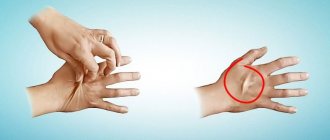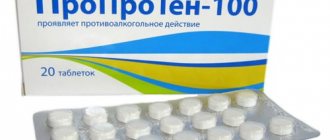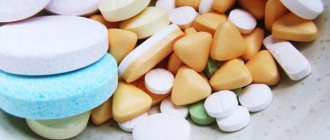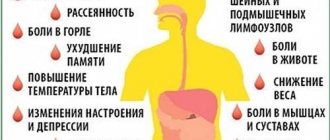Alcohol intoxication - symptoms:
- Headache
- Weakness
- Nausea
- Dizziness
- Vomit
- Speech Impairment
- Sweating
- Facial redness
- Impaired movement coordination
- Extreme thirst
- Trembling in the body
- Absent-mindedness
- Pupil enlargement
- Impaired consciousness
- Motor retardation
- Sparkle in the eyes
- Slow heart rate
- Liberation
- Slow facial expressions
- Slowness of reactions
What is alcohol intoxication
Alcohol intoxication is a complex of behavioral disorders, physiological and psychological reactions that usually begin to progress after drinking alcohol in large doses.
The main reason is the negative impact of ethanol and its breakdown products on organs and systems, which cannot leave the body for a long time.
This pathological condition is manifested by impaired coordination of movements, euphoria, impaired orientation in space, and loss of attentiveness. In severe cases, intoxication can lead to coma.
- Degrees
- Kinds
- Acute form
- Chronic form
- Symptoms
- Diagnostics
- Treatment
It is worth noting the fact that intoxication significantly increases the risk of exacerbation of many chronic pathologies, and also provokes the occurrence of conditions that pose a danger to both health and human life. Clinicians include these conditions:
- hypertensive crisis;
- stroke;
- arrhythmia;
- IHD;
- myocardial infarction.
Degrees of alcohol intoxication
Depending on the general condition of a person, there are three degrees of alcohol intoxication:
mild degree. Ethanol reaches the brain, while dilating blood vessels located as close as possible to the surface of the skin. At the same time, a blush appears on the person’s face. The alcohol content in the bloodstream does not exceed 2%. This stage is manifested by the following signs: high spirits, dilated pupils and possible diarrhea. The person also experiences increased sweating, frequent urination, and incoherent and excessively loud speech. Usually this degree does not last long, and nothing needs to be done to eliminate it (medicines are not used);
average degree. The bloodstream contains 2 to 3% alcohol. The person's general condition deteriorates significantly. Gait and visual function are impaired (double vision). Speech is unintelligible. At this level, a person usually falls asleep very quickly. The next morning he shows all the signs of a hangover.
severe degree. The alcohol content in the bloodstream exceeds 3%. This stage is the most dangerous, since with its development the risk of death increases significantly. Due to severe alcohol intoxication, respiratory function may be impaired, the heart may stop, and an alcoholic coma may occur. If nothing is done at this time, death will occur. At the first signs of pathology, you should immediately call an ambulance.
Blood alcohol content and functional assessment
Prevention
The best recommendation is to not drink at all. In this case, it is impossible to use a surrogate and it will not be possible to overdo it with a dose of alcohol. If you want to relax and relieve stress in the company of friends, remember the following:
- Do not take alcoholic drinks on an empty stomach, eat more;
- do not drink ethanol if you have pathologies of the digestive system, liver and kidneys;
- be wary of homemade wine and beer products;
- do not combine alcohol with taking medications (neuroleptics, antibiotics, narcotic analgesics, sleeping pills);
- do not mix drinks of different degrees;
- dispose of expired products in a timely manner;
- Buy only certified products from trusted stores, avoid fakes and counterfeits.
It is very important to find for yourself the amount of alcohol after which you should stop. In this case, the risk of developing poisoning is minimal.
It is also necessary to engage in social education of adolescents who want to feel grown-up and liberated. It is necessary to convey in an accessible form that drinking in large quantities is harmful, everything should be in moderation, in adequate proportions.
Kinds
acute alcohol intoxication;
chronic alcohol intoxication.
Acute form
Acute alcohol intoxication is usually diagnosed in people who do not regularly drink alcoholic beverages. It manifests itself as euphoria, impaired coordination of movements, and impaired attention. Nausea and vomiting may occur. These signs of alcohol poisoning can be treated by taking aspirin and diuretics. It is also important to drink more fluids. People often resort to traditional medicine - drink brine or kefir. It is not recommended to do this, as it can only worsen your condition.
Chronic form
If a person regularly drinks alcoholic beverages, he develops chronic alcohol intoxication. This condition is very dangerous, as it entails toxic damage to internal organs. As a result, a person with alcohol dependence exhibits the following symptoms:
- arterial hypertension;
- anxiety;
- hyperhidrosis;
- tremor;
- muscle atrophy;
- dystrophy;
- hyperemia of the skin on the face.
Clinical signs of alcohol poisoning
The signs of acute alcohol intoxication are similar for most people. The strength of their manifestations is influenced by the presence of chronic diseases, as well as the possible interaction of alcohol with other chemicals or drugs. Common symptoms:
- severe nausea and vomiting;
- abdominal pain;
- feeling of lack of air, shortness of breath;
- severe tachycardia or decreased heart rate;
- lack of coordination, inability to stand on your feet;
- drop in blood pressure;
- pale skin, cold sweat.
In ethanol poisoning, signs of dysfunction of the gastrointestinal tract often predominate, while a person can maintain adequacy.
Neurological symptoms - severe headache, incoherent speech, disturbance of consciousness - are typical when consuming large doses of ethanol, the presence of methyl or isopropyl alcohol in the drink, or combining alcohol with medications.
Symptoms of alcohol intoxication
Symptoms of alcohol intoxication photo.
Symptoms of alcohol intoxication begin to appear when ethanol accumulates in the body:
- inhibited facial expressions;
- speech disorder;
- dilated pupils;
- the person is very thirsty;
- headache;
- dizziness;
- retardation of movements;
- severe nausea;
- vomit. Thus, the body independently tries to get rid of the poison;
- sparkle in the eyes;
- pulse slows down;
- reassessment of one's capabilities;
- liberated instincts;
- weakness;
- disturbance of consciousness.
Diagnostics
If symptoms of alcohol intoxication appear, the person should be immediately taken to a medical facility. Diagnosis of the pathological condition is not difficult, since the clinical picture is quite clear. To determine the alcohol contained in exhaled air, the qualitative Rappoport reaction is used.
Additional diagnostic techniques:
- Karandaev method;
- ADN method;
- photometric method;
- gas-liquid chromatography method.
How to prevent poisoning
To avoid becoming a victim of alcohol intoxication, it is better to completely avoid drinking alcohol.
As additional measures to prevent poisoning, doctors recommend:
- do not drink on an empty stomach;
- know and observe your limits;
- do not drink alcohol with carbonated drinks;
- a few hours before the feast, drink 50 g of vodka or take one of the absorbents.
Also, to prevent poisoning, you should purchase alcohol only from trusted brands and only in large retail chains. Since it is impossible to determine from the appearance of the bottle how harmless its contents are.
Treatment of alcohol intoxication
Treatment of alcohol intoxication is carried out both at home and in the hospital. In case of severe poisoning, it is recommended to place the patient in a hospital so that he is under constant medical supervision. The first thing to do is to prevent further absorption of alcohol into the body. For this purpose, the patient is given 10 tablets of activated carbon, after which the stomach is washed with warm water.
To reduce the concentration of alcohol in the blood, the following drugs are used:
- sterile glucose solution;
- ascorbic acid;
- a nicotinic acid.
In case of severe alcohol intoxication, doctors resort to intravenous administration of drugs containing active substances. This should only be done in a hospital setting so that the doctor can monitor the patient’s condition. The following drugs are prescribed for therapeutic purposes:
- panangin;
- isotonic solution;
- calcium chloride;
- Ringer's solution;
- glucose solution;
- rheopolyglucin;
- polyglucin;
- hemodesis;
- neohemodesis.
Drug therapy also includes the following drugs:
- analeptics and psychostimulants: cordiamine, sulfocamphocaine;
- vitamins: ascorbic acid, nicotinic acid, thiamine chloride;
- antispasmodics: aminophylline, papaverine, no-spa;
- hepatoprotectors (drugs that protect and restore liver cells): piracetam, essentiale, mildronate;
- psychotropic drugs.
Helping someone who is intoxicated
Removal of alcohol intoxication is permissible at home only in cases of mild or moderate degree, when the basic life support functions of a person are not in danger - consciousness, normal breathing are preserved, and there are no signs of bradycardia or arrhythmia. In case of indomitable vomiting, signs of hypoxia, convulsions or disturbances of consciousness, as well as suspected use of surrogates, qualified medical assistance is required.
If severe nausea, ripples in the eyes, pain in the epigastrium or abdominal cavity, or a feeling of lack of air appear after drinking alcohol, immediate action must be taken. If an intoxicated person is able to act adequately, he can provide first aid to himself. If you lose orientation, additional assistance from the outside will be required.
- You should not restrain the urge to vomit; on the contrary, the stomach needs to be helped to free itself from the alcohol it contains. Sometimes this is enough to significantly alleviate the condition. If there is no vomiting, it is necessary to induce it in the generally accepted way, pressing with fingers or a spoon on the root of the tongue with one hand and on the stomach area with the other.
- To better cleanse the gastrointestinal tract, it is recommended to perform a gastric lavage: drink 1-2 glasses of slightly warm water, then empty the stomach. Repeat the steps several times until the rinse water becomes clear.
- After cleansing, be sure to take enterosorbent. Regular activated carbon is suitable; its urgent use in case of alcohol intoxication is considered preferable due to its rapid action and the impossibility of overdose. It is advisable to immediately drink at least 10 tablets or 3 teaspoons of the powder with water. Charcoal has the ability to quickly bind toxins without disrupting intestinal motility.
- For severe headaches, dazedness, muscle weakness, and dizziness, you can take 2 tablets of glycine. This is a natural amino acid that regulates a number of biochemical processes that are disturbed during intoxication. It will not cause harm, but will help you get rid of poor health faster. In case of severe nausea, you are allowed to take 1-2 tablets of Allochol to ensure better detoxification. In addition to herbal components, this drug contains the necessary bile acids.
If you are very intoxicated after the first procedures, the victim should sit down, leaning back in a chair or sofa, and tightening clothing should be loosened or unfastened. It is necessary to ensure an influx of fresh, preferably cool, air - open the windows and doors. If you feel very faint, you can sniff ammonia and apply a cold wet lotion to the back of your head and temples. If your health allows, it is better to go out onto the balcony or outside. Oxygen will speed up the processing of alcohol in the body and improve well-being.
Preventing dehydration
It is important to remember that when relieving alcohol intoxication at home, an intoxicated person should not drink strong tea, coffee, lemonade or energy drinks. Such attempts to “get back into shape” can cause severe vascular disorders or the opposite effect to the desired effect - increased intoxication. In addition, such drinks have diuretic properties, exacerbating the pathological effects of alcohol.
To prevent dehydration due to severe vomiting, rehydration may be required - taking water-salt solutions to maintain electrolyte balance. For this purpose, you can use pharmaceutical preparations Regidron or Gidrovit, containing potassium, sodium, and glucose salts. Before use, the powder is diluted in water. You can prepare a healthy drink yourself. To do this, dissolve 1 teaspoon of salt and sugar and 0.5 teaspoon of baking soda in 1 liter of water. The liquid is taken little by little as soon as the stomach stops rebelling. If severe vomiting continues, it is advisable to drink the solution after each attack until the condition stabilizes.
Read also: How much alcohol can you bring to Poland?
The best way to further relieve alcohol intoxication at home is sleep, during which the load on the central nervous system and internal organs decreases. Thanks to this, it becomes easier for the body to cope with poisoning.










